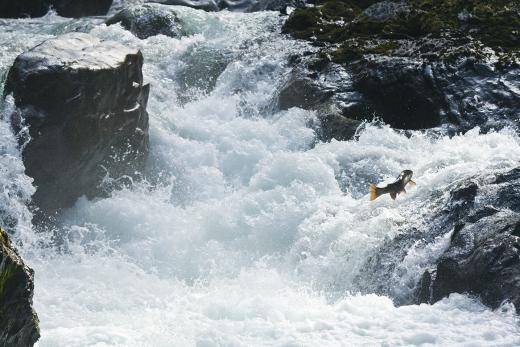Shenandoah Perfection
The hint of spring leaves yet to sprout on the oaks and hickories of Appalachia might be one of the most uplifting illusions to the eye. A close look at a single tree branch reveals almost no real evidence that winter is giving up the ghost. But taken in as a landscape, with thousands upon thousands of branches hanging nude over the cold, clear water of a Shenandoah trout stream, it's clear that spring is finally springing.
Thank God for that.
And thank God for the brookies that seem to know a new season is almost upon them. While it might not be the proverbial "season of plenty," the rare native char of the Eastern Seaboard do seem to perk up a bit when the weather warms, and when a dry fly is put within reach.
As we wandered up and over a steep ridge within the confines of Shenandoah National Park one late March day, the only real evidence of spring--outside of the sweat-inducing hike in the warm and, dare I say, muggy conditions of the day--was the purple-pink blooms on the redbuds and the bright-white flowers on the limber dogwoods that lined the trail. The slices of color served to emphasize the almost-green hue of the woods that served, if nothing else, to lift spirits. Winter would soon be a thing of the past. New life was springing from the mountains.
Spring was confirmed when we got the water and dipped our toes into the run. The water was cold and clear, shaded sparsely by the bare branches above. A brook trout nosed the surface after a small mayfly. Seconds later, another rise. In days, I knew, those branches would hold tender leaves, and within a couple weeks, they'd shelter the creek altogether, when the weather would really get warm, and the determined, yet fragile brook trout that finned in the creek would need the shade the most.
For now, though, the brookies seemed plenty happy. Within just a few casts of the 12-foot Tenkara rod, I'd managed to miss a couple of eager strikes and connect with one tiny char whose eyes were clearly larger than it's stomach. Even the size 16 Adams proved to be more than a mouthful. Within fifteen minutes, three brookies had come to hand--nothing big, of course, but if you're after big fish in the Shenandoah backcountry, you're likely in for a long day.
I adore brook trout, both for their sheer beauty and for what I consider to be one of the more impressive wills to survive in the face of some pretty serious threats. And that's especially true of the brookies that live where they're supposed live--in the heart of Appalachia, where intact habitat is at a premium and where cold, clear water comes and goes at the whim of the weather.
I might get to chase these fish in their native waters once or twice a year. And while the fish are diminutive, they burn with life. With the supple Tenkara as the weapon of choice on small, backcountry water, they get to show off a disposition a fish twice the size would do well to emulate. Brookies are fighters. Brookies are survivors.
Brookies are damn near perfect. And, where they belong, their presence is priceless. I consider casting to brookies where brookies are supposed to swim an event, a full-on occasion.
I can't count the times I've been asked about my preoccupation with brook trout, and how I can be so completely consumed with catching something so small, so insignificant.
My answer is simple: Suspend the obvious, where a yardstick might measure the importance of a catch and ask, instead, how convincing a fish so small to hit a fly can mean something so big.
For me, it's easy. For others, it's a stretch, and I get that. We all have our favorites. For some, it's big-shouldered brown trout fought to hand through fast water. Others love the frustration that accompanies chasing steelhead, because success in that endeavor means so much.
Brookies, where they belong, are all about what's right with the world. They prove that, with clean water running over the bedrock beneath the green canopy of an Appalachian forest, things can be just as they're supposed to be.
That's about as close to perfect as it gets, don't you think?



Comments
Very well done. I often had
Very well done. I often had to explain my love for this fish to friends and loved ones and have very often come up short. This post expresses that idea so well. Excellent work.
I love the photo. Was that
I love the photo. Was that taken in Virginia?